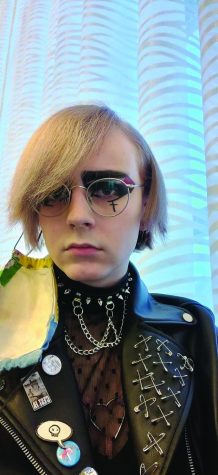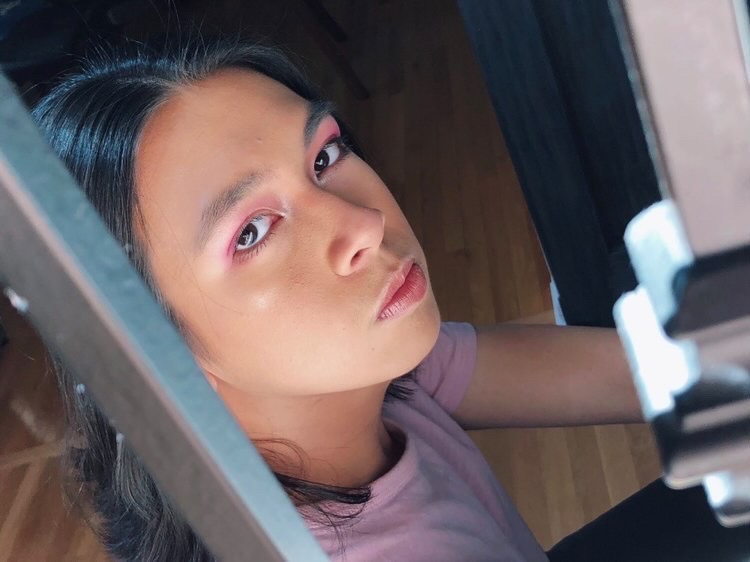
International Women’s Day 2021, as she believes in supporting female filmmakers by watching more of their content.
Lana Black, transgender girl and junior, often watches “The Watermelon Woman,” a 1996 film by Cheryl Dunye; it is one of her favorites. Black said she likes to watch films made by women as she believes more media representation would help women be recognized more.
Representation for women and transgender people is more prevalent than ever during March. International Women’s Day was on March 8, and March 31 is International Transgender Day of Visibility. Jillian Escobar, transgender girl and junior, said it is important to recognize the messages the month stands for. Escobar said it is crucial to have a month that could bring to light issues faced by cisgender and transgender women and help spread the word about them.
Black also said she believes the word should be spread.
She said, “I think that women’s history should be celebrated every day, but it’s cool to have a day or a month to remind people to (remember women’s history).”
Both Black and Escobar said they believe educating oneself about both women’s and transgender issues is important. They said learning the history of women, and transgender women especially, is helpful for those who consider themselves allies.
“I don’t think people really can believe that these things are real, or that these people have existed forever, if they don’t actually see the history of it,” Escobar said. “I think it’s also good for trans women to see themselves in other historical figures and be like, ‘Oh, I’m not alone. It’s not just me.’”
Amy Liptak, licensed mental health counselor, said she agreed with that statement. Liptak said celebrating Women’s History Month and days like International Women’s Day are important.
“It is a day to give special attention to the role women play in our society, how those roles have changed and need to continue to evolve and change, and an opportunity to keep moving women’s rights forward,” she said via email.
Liptak also said it is important to recognize that International Women’s Day is a day to be celebrated by transgender women as well, as it highlights that they are women, regardless of transphobic beliefs that transgender women are not women.
“Excluding transgender women and not considering them to be women is extremely damaging to the transgender community, and prohibits transgender women from having equal rights, and to be seen and heard for who they are: women,” she said.
Black said women, cisgender and transgender alike, face many issues in today’s world.
“Just too often, women and trans people get left behind in public discourse and there’s this idea that we don’t exist or that our issues don’t matter as much as men’s or cis people’s,” Escobar said.
Black also said, as a transgender girl, sometimes things are harder for her at school.
“(The biggest issue for women) is getting others to find us on an equal playing field and especially as a trans woman in Carmel, as many people don’t take us seriously, (and) kind of treat our existence as an aberration,” she said.
For her part, Escobar said she has received uncomfortable looks from various faculty members when she tried to use the girls restroom. Black said a common solution given by administrators when a student comes out as transgender is to use staff restrooms, which she said ended up with some teachers yelling at her for using the staff bathroom.
Both Black and Escobar said “deadnaming” (calling a transgender person by their birth name after they have changed their name as part of their transition) is something that happens in the case of substitute teachers. Though it is not necessarily transphobic, Escobar said, many teachers don’t know better. Legal difficulties in the process of changing one’s name have contributed heavily to this problem.
Black added that support from other women, especially in the transgender community, is an important way for women’s and transgender rights to advance.
Liptak said, “I think it is very important for there to be a sense of solidarity and support between women. I think women already do a great job of this in many ways.”
Escobar agreed, saying she has received a lot of support from peers, especially in choir.
She said, “One of the words when I think of womanhood is ‘community.’ It’s a community of women who have shared experiences and who are able to communicate about them, but everyone is different, so it’s a balance between community and individualism.”
CHS social worker Mary Reese said the school takes seriously its role in helping any students who come out as transgender or non-binary. Reese said this included talking with parents and students to come up with a Gender Support Plan to further help these students in any way necessary. Reese said students are also assigned a staff point person to go to for all their needs and that the CHS Equity and Inclusion Alliance made up of staff members always discusses new ways to make these students more comfortable at school. Read more about CHS’s policies regarding transgender student transitions here.
Black and Escobar said the best way for other students to support their transgender peers is to educate themselves on transgender issues and not be insensitive.
Liptak said, “With so much misinformation, hatred and intolerance in our society, it is critical that allies understand that language matters, asking someone their pronouns matters, and our behaviors matter. Accepting, embracing, and creating an inclusive society of all people is so important.”
Escobar said, “(When) trying to define what exactly makes you a woman, if it’s not genitalia, what is it? I’m not entirely sure there are words for it, but there is a feeling, and somehow our brains just know, we all know how we feel, inside, about ourselves, somehow we just figure our identity out.”



































![British royalty are American celebrities [opinion]](https://hilite.org/wp-content/uploads/2024/03/Screenshot-2024-03-24-1.44.57-PM.png)


















![Review: “Suits” is a perfect blend of legal drama and humor [MUSE]](https://hilite.org/wp-content/uploads/2024/04/unnamed-1.png)
![Chelsea Meng on her instagram-run bracelet shop [Biz Buzz]](https://hilite.org/wp-content/uploads/2024/04/IMG_2446-1200x838.jpg)
![Review: Quiet on Set: The Dark Side of Kids TV is the long awaited exposé of pedophilia within the children’s entertainment industry [MUSE]](https://hilite.org/wp-content/uploads/2024/04/unnamed.jpg)
![Review: “The Iron Claw” cannot get enough praise [MUSE]](https://hilite.org/wp-content/uploads/2024/04/unnamed.png)
![Review: “The Bear” sets an unbelievably high bar for future comedy shows [MUSE]](https://hilite.org/wp-content/uploads/2024/03/unnamed.png)
![Review in Print: Maripaz Villar brings a delightfully unique style to the world of WEBTOON [MUSE]](https://hilite.org/wp-content/uploads/2023/12/maripazcover-1200x960.jpg)
![Review: “The Sword of Kaigen” is a masterpiece [MUSE]](https://hilite.org/wp-content/uploads/2023/11/Screenshot-2023-11-26-201051.png)
![Review: Gateron Oil Kings, great linear switches, okay price [MUSE]](https://hilite.org/wp-content/uploads/2023/11/Screenshot-2023-11-26-200553.png)
![Review: “A Haunting in Venice” is a significant improvement from other Agatha Christie adaptations [MUSE]](https://hilite.org/wp-content/uploads/2023/11/e7ee2938a6d422669771bce6d8088521.jpg)
![Review: A Thanksgiving story from elementary school, still just as interesting [MUSE]](https://hilite.org/wp-content/uploads/2023/11/Screenshot-2023-11-26-195514-987x1200.png)
![Review: When I Fly Towards You, cute, uplifting youth drama [MUSE]](https://hilite.org/wp-content/uploads/2023/09/When-I-Fly-Towards-You-Chinese-drama.png)
![Postcards from Muse: Hawaii Travel Diary [MUSE]](https://hilite.org/wp-content/uploads/2023/09/My-project-1-1200x1200.jpg)
![Review: Ladybug & Cat Noir: The Movie, departure from original show [MUSE]](https://hilite.org/wp-content/uploads/2023/09/Ladybug__Cat_Noir_-_The_Movie_poster.jpg)
![Review in Print: Hidden Love is the cute, uplifting drama everyone needs [MUSE]](https://hilite.org/wp-content/uploads/2023/09/hiddenlovecover-e1693597208225-1030x1200.png)
![Review in Print: Heartstopper is the heartwarming queer romance we all need [MUSE]](https://hilite.org/wp-content/uploads/2023/08/museheartstoppercover-1200x654.png)






















![Review: Ladybug & Cat Noir: The Movie, departure from original show [MUSE]](https://hilite.org/wp-content/uploads/2023/09/Ladybug__Cat_Noir_-_The_Movie_poster-221x300.jpg)

![Review: Next in Fashion season two survives changes, becomes a valuable pop culture artifact [MUSE]](https://hilite.org/wp-content/uploads/2023/03/Screen-Shot-2023-03-09-at-11.05.05-AM-300x214.png)
![Review: Is The Stormlight Archive worth it? [MUSE]](https://hilite.org/wp-content/uploads/2023/10/unnamed-1-184x300.png)


